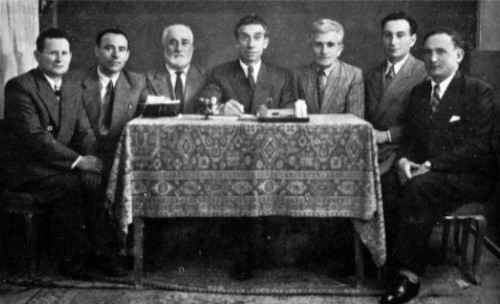 |
(From right to left): Moishe Pelz, Dovid Brenner, Shalom Wasserstrom, Moishe Nachshon (Capa), Hershl Kopelman, Aryeh Weinriber, Ze'ev Bratten
|
|
[Page 429]
[Page 430]
|
|
(From right to left): Moishe Pelz, Dovid Brenner, Shalom Wasserstrom, Moishe Nachshon (Capa), Hershl Kopelman, Aryeh Weinriber, Ze'ev Bratten |
[Page 431]
Very few Jews managed to get to Eretz-Israel in the period between the two world wars. But those who did succeed in coming to the land of our fathers, tried with all their strength, as much as the conditions permitted, to maintain close contact among themselves, and in that way, to remain true to the family atmosphere of the shtetl. The connection was also expressed in reciprocal brotherly aid for those who needed it. There was not a simcha in which a Markuszower in Israel did not invite all his fellow citizens to share in the joy. As individuals and as a group, we all felt close like a family, and did not want to become estranged.
This family framework became too small, however, after the arrival of the survivors of Hitler's hell. The need for an organization was felt because every newcomer presented a problem: how to help him get settled, get a loan, find a place to live, work, and all the rest that a new immigrant requires. So they got down to really talking about creating an organization offering financial aid. But it would take time to realize these tasks. And help was needed immediately. In 1946 a partisan couple from the shtetl arrived and we considered it our holy duty to help them with both the wedding, and with getting them settled into the new land. Good intentions, love of one's fellow man and Markuszow good-heartedness from individuals brought help and encouragement to our olim[2]. They were given loans for constructive goals, or given practical suggestions as to how to make their first steps, or given the address of someone from the town, our own people with whom they could rejoice after surviving such horrible years of separation, hope and yearning.
The actual organization of Markuszow landsleit in the state of Israel dates from winter 1951, when we got together in the home of
[Page 432]
|
|
[Page 433]
Mr. Hershl Kopelman in Tel Aviv. We immediately began to talk about concrete matters like: helping the olim, memorial services, yizkor book, and connections overseas.
Now, after five years of organizational activity, we can state that all four of our goals were fulfilled.
More than one Markuszower in Israel, of the fifty, could tell of the warmth and help he received from the moment he stepped over the threshold of the state and sought out a landsman. With no relief fund, without special contacts, and limited opportunities the organization tried to deliver a helping hand wherever there was a need. Every year since 1951, on Isru Chag Pesach,[3] a memorial service took place in which all the Markuszowers in Israel participated. On these impressive occasions, the unforgettable sorrow for the lives of our loved ones that were cut down is expressed. These Yizkor evenings also brought the opportunity for people to get together and share memories, talk about the present, and form plans for the future.
There was a feeling, however, that memorial service alone would not fulfill the debt of perpetuating their memory, if we did not create a spiritual memorial in the form of a yizkor book. That idea was circulated–and from the beginning of 1953 all the effort and exertion of the board was directed to creating the yizkor book, the true monument to Jewish Markuszow.
The entire organization was converted to a book committee that, together with the editor, had the laborious responsibility to put together material for the book. Three years of constant financial, moral, and physical efforts gave results in the form of the present yizkor book.
Work on this book gave us the opportunity to be in constant contact with our landsleit in both Americas, France and Australia. The first financial help for the yizkor book from Markuszowers in Argentina gave us in Israel a push toward wide-ranging efforts to find the necessary sums for such an undertaking.
The issuing of the book did not mean the end of the committee's task. There was a project to publish the book in Hebrew, maintain the beautiful tradition of annual memorial services, caring for and helping the landsleit in need, and continuing contact with Markuszowers through the world.
[Page 434]
|
|
Translator's Footnotes:
|
|
JewishGen, Inc. makes no representations regarding the accuracy of
the translation. The reader may wish to refer to the original material
for verification.
JewishGen is not responsible for inaccuracies or omissions in the original work and cannot rewrite or edit the text to correct inaccuracies and/or omissions.
Our mission is to produce a translation of the original work and we cannot verify the accuracy of statements or alter facts cited.
 Markuszów, Poland
Markuszów, Poland
 Yizkor Book Project
Yizkor Book Project
 JewishGen Home Page
JewishGen Home Page
Copyright © 1999-2025 by JewishGen, Inc.
Updated 1 Mar 2025 by LA